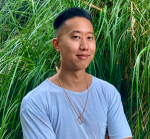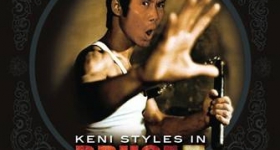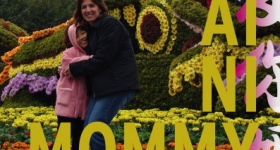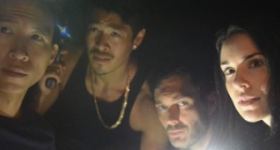On an already simmering Wednesday morning in the heart of West Hollywood, I met up with stand-up comedian and actor Ronny Chieng at Pailhouse, a boutique hotel. Ronny, who is best known to American audiences as Trevor Noah’s spirited senior correspondent on The Daily Show, shared his excitement over being cast as Eddie Cheng in the upcoming Crazy Rich Asians.
Dressed in a fitted gray blazer with matching slacks and slicked back hair, Ronny exudes both tact and professionalism carried over from his work on The Daily Show, which is a sharp contrast to the larger-than-life characters he has played on TV. His background — a true multi-hyphenate identity — traces roots from New Hampshire to Singapore to Australia and back to the United States again. In that span, he’s sold out multiple stand-up world tours, created the autobiographical comedy series Ronny Chieng: International Student and famously called out racist news segments, energizing the Asian American community toward action. As I listened to Ronny describe his professional grind — which includes stand-up every night in New York and touring three continents — I encountered a humble and dedicated entertainer ready to take his craft to the next level.
Check out my full interview with Ronny in the SoundCloud link or an edited transcript below:
This interview has been edited for length and clarity.
Christian Ting: American audiences might know you best from your work on The Daily Show, but prior to that you found success in the autobiographical comedy series Ronny Chieng: International Student. How does one make the jump from law school to acting?
Ronny Chieng: Well that’s the thing — you introduced me as actor but my thing is stand-up. I started in stand-up, I still do it every night in New York, I still feel like it’s the professional cornerstone of mine. So I went from law school to stand-up. I was doing national theater tours in Australia and then I met Trevor Noah at Montreal’s Just For Laughs in 2014 and did a show with him. He complimented me and then we didn’t speak for two years. When he got the Daily Show job in 2015, he asked me to audition for it. I can’t speak exactly how one goes from law school to acting, but the funny thing is three of us in Crazy Rich Asians went to law school, so maybe in order to get into the movies you need to go to law school first (laughs).
CT: Interestingly enough, I had the chance to interview a fellow Asian Australian actor (and former law school classmate of yours), Desmond Chiam, who mentioned you in his interview as being part of a recent wave of creators bringing Asian-led content to Australian audiences. Given your work here in the United States, what unique qualities about the Asian Australian community, culture and comedy did you want to see explored?
RC: Me and my co-creator Declan were approached by ABC in Australia — not to be confused with the ABC in America, as it’s more like PBS, with a little bit more scripted stuff — they said hey, we want you to pitch us a TV show. Thankfully I was experienced enough in being able to tell a story that nobody else could tell — not thinking about the market whatsoever — and that story was the international student experience in Australia. I felt like it was very much a part of the Australian story. It then became a college story, from the point of view of international students. Another aspect of it is how it relates to the Western world — specifically how the West interacts with the East is through extreme wealth and international students studying in colleges. My experience in college was rich idiots fighting rich idiots.
CT: I’d love to hear more about how your show incorporated diversity as well. Was it important for you to have casting that reflected your experience?
RC: Yeah absolutely. It is a story about international students so we’re going to have a bunch of Asian kids in it. The joke of the show is “international” in Australia meant Asian. So obviously we’re going to have an all-Asian cast. That wasn’t diversity for the sake of diversity. It was because in order to tell this story we need a bunch of Asian students interacting and to also show that we’re not a monolith so that we have people from China, Vietnam, etc. The joke would be that we would all be there and people would think we’re a gang but we actually just hated each other (laughs). But we get lumped together because we’re all Asian. The one thing that was really important to me was getting the accents right. I gotta tell you man, Asian Australian actors have gotten the Asian accent beat out of them because the moment they go to auditions, if you have any hint of it, they’re like get out. So even Australian Asian actors couldn’t do the accent accurately and the last thing you want is a bunch of Asian people doing bad Asian accents on TV. Authenticity resonates.

(Courtesy of Sanja Bucko)
CT: Your transnational identity, with roots from New Hampshire to Singapore to Melbourne, is truly fascinating in the type of media it exposed you to in your life. It also made you an ideal casting choice in Crazy Rich Asians. Can you talk a little bit about how you got involved with the film, which will mark your American feature debut?
RC: So the book was on my radar, because how often do you get a Singaporean story that’s making it big in America? At the time, I was filming Ronny Chieng: International Student in Australia, and at that point it was a pipe dream to get involved with a movie. Halfway through filming I was reading an article about Jon M. Chu having trouble casting because he was looking for authentic accents. So I called my agent and was like, “I’ll literally never pull this card, but if you get me an audition, I will book this role because I know this story, I know these people, I grew up in Singapore — and it’s the only accent I can do.” He got me an audition in Australia and I auditioned for Bernard and Eddie, and two months later, I got the role of Eddie. I was so excited. I got to know Jon too, who is a really great guy and great representative for Asian Americans. He was really positive and down–to–earth. And going back to your first question, you need people to be aware of you but you also need to prove yourself as well. You gotta deliver.
CT: Tell us about your character, Eddie Cheng. What would he think of the Pailhouse as a venue? Too bougie? Not bougie enough?
RC: He would think this is low-class and think most of L.A. is terrible. He’d probably be into the party scene and appearing in the social magazines and Instagram. He’s hugely obnoxious, very reputation and wealth-conscious, obviously extremely wealthy and spoiled but also very insecure. I mean, all of that stuff comes from insecurity. He’s just a huge piece of shit but also capable of having honest conversations as well.
CT: What did you tap into to bring out the essence of Eddie?
RC: I don’t know if you’ve met the rest of the cast, but everyone was cast pretty close to their personalities. There’s very little acting going on. I’m trying to think of who had to act the most — probably Sonoya Mizuno — she’s so calm and graceful, but in the movie she’s all amped up. For me, honestly, I give that vibe very well, the whole dick vibe comes pretty natural to me. I feel like I naturally give off this intense, aggressive vibe pretty easily — if you’ve seen my stand-up it’s just me yelling at people (laughs).
CT: What was your experience like working on the set of Crazy Rich Asians? What were some fun things you guys did behind the scenes? Did you get to keep any of your outfits?
RC: We didn’t get to keep any! But no joke, the cast became like family, and I think anyone would say this. It’s the truth. We still have a WhatsApp group, we talk all the time, whenever we’re in the same city we always meet up. I just went to Jimmy O. Yang’s house last night. I go to Jon’s house a lot. I have nothing to compare it to because it’s my first project so it was great to me. We all got along because we were all Asian people in our 30s, in show business — we all had the same vibes and struggles. We got it immediately and we knew the deal. People sacrificed a lot to be a part of this project. The part about us all being Asian, well, we went out to eat all the time and then karaoke at night — it was a blast.
CT: I definitely can’t speak to the amount of toll it had on the actor’s part, but what I can speak to is the momentousness this is for the Asian American community and I believe that I can speak on behalf of a lot of communities here that there is something so joyful about seeing people like us on screen. There’s a value to that that cannot be measured by any Nielsen rating or box office return.
RC: See, that’s the thing. The producers had the option of going to Netflix but felt strongly they wanted a theatrical release for less money. How often in this business does anyone make a decision that isn’t based on the bottom line? They wanted a theatrical release! Jon and all the producers were all on the same page — the point of this is to show it in theaters. I’m glad you talk about the positives of it because there are a lot to draw from it. I think it’s tough with Asian Americans because we’re not a monolith, so there can be a lot of negativity in the story and what it’s portraying, but it’s still a positive rom-com. It’s a good movie — I might be biased though (laughs).











Comments